

Sustainability goes mainstream: Insights into investor views. What do investors think about sustainability issues?
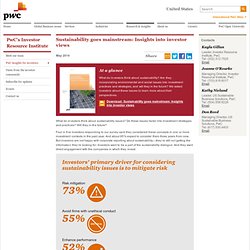
Do these issues factor into investment strategies and practices? Will they in the future? Four in five investors responding to our survey said they considered these concepts in one or more investment contexts in the past year. And about 85% expect to consider them three years from now. But investors are not happy with corporate reporting about sustainability—they’re still not getting the information they’re looking for.
Methodology and demographics A diverse mix of institutional investors responded to the survey: About 45% are asset managers, one-third are pension funds, and the remaining represent a variety of other types of organizations. ¹To calculate AUM, we used the low number within the range provided in survey results (i.e., for those responding that they manage assets valued at “between $25 billion and just under $100 billion,” we used $25 billion in our AUM calculation). Ten Things I Learned As A Sustainability Advisor - Lesson #7: Employee Engagement Empowers Solutions-Oriented Thinking I’ve seen examples first hand where a desire for improved sustainability performance led to greater cross-departmental collaboration.
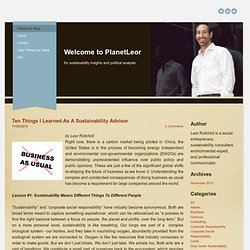
Through the DJSI process at Cenovus, the Corporate Responsibility (CR) team identified that supply chain management was an area that required more sustainability support. We could see from that group’s responses to the DJSI questions that they did not have the capacity to measure sustainability performance with respect to local content, greenhouse gas emissions and Aboriginal employment in the company’s supply chain.
The CR team developed a series of workshops to bring key people together from across the company to think through all the impacts associated with each stage of the business process. The Consequences of Mandatory Corporate Sustainability Reporting by Ioannis Ioannou, George Serafeim. Ioannis Ioannou London Business School George Serafeim Harvard University - Harvard Business SchoolMarch 30, 2011 Harvard Business School Research Working Paper No. 11-100 Abstract: We examine the effect of mandatory corporate sustainability reporting (MCSR) on several measures of social responsibility using both country and firm-level data.
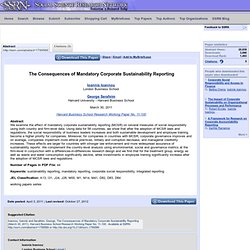
YummySustain : Kudos for @Dell in ... Dell introduces a recycled plastic pc and carbon negative packaging. Dell has announced two industry firsts for the IT sector with the launch of a computer made with certified closed-loop recycled plastics and the introduction of carbon-negative packaging.
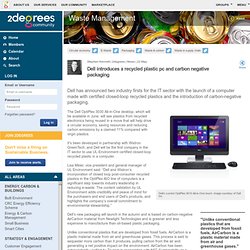
The Dell OptiPlex 3030 All-in-One desktop, which will be available in June, will see plastics from recycled electronics being reused in a move that will help drive a circular economy, saving resources and reducing carbon emissions by a claimed 11% compared with virgin plastics. It’s been developed in partnership with Wistron GreenTech, and Dell will be the first company in the IT sector to use UL-Environment certified closed-loop recycled plastic in a computer. Lisa Meier, vice president and general manager of UL Environment said: “Dell and Wistron’s incorporation of closed loop post-consumer recycled plastics in the OptiPlex AIO line of computers is a significant step towards industry leadership in reducing e-waste.
Promod and sustainability: E-label. Dont buy Click here for score rapport: 0 out of 20 Based on our sustainability criteria, Promod has achieved the E-label.
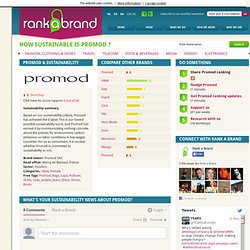
This is our lowest possible sustainability score, and Promod has earned it by communicating nothing concrete about the policies for environment, carbon emissions or labor conditions in low-wages countries. For us as consumers, it is unclear whether Promod is committed to sustainability or not. Brand owner: Promod SAS Head office: Marcq en Baroeul, France Sector: Retailers Categories : Male, Female Free Tags: Promod, Bags, Caps, Pullover, Shirts, Suits, Jackets, Jeans, Dress, Shoes, Boots. YummySustain : How to know Uniqlo's #labor ... How To Use One Paper Towel: Joe Smith at TEDxConcordiaUPortland. Childrens_Rights_in_Reporting_Second_Edition_HR. The Future of Sustainability Reporting: 10 Trends.
The field of corporate sustainability reporting is maturing and evolving, making it important to keep up with the changing standards and expectations long after you complete this lesson in Sustainability 101. As you get more experience in this discipline, continue to watch what the leaders do. Keep up with issues on the horizon through the conversations on blogs, Twitter and LinkedIn. And, attend conferences to hear from the experts when you can. At Emotive Brand, we strive to keep our finger on the pulse of the industry in order to help our clients put in place strategies that demonstrate leadership even as the standards evolve. For a peek into the future, the following is adapted from a blog post written by my friend and colleague, the brilliant Thom Elkjer. We believe that in the next decade corporate sustainability reporting will become: Hard data is already the standard, not the exception, for reporting leaders.
Can You Spot These 13 Sustainability Trends for 2013. Opportunities, both small and big, are plentiful in today’s business environment: growing consumer eco awareness, innovative ways of doing things, a crisis or a threatening trend.
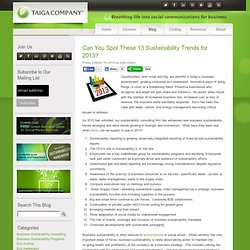
Proactive businesses who recognize and adapt will gain share and influence. No doubt, when faced with the realities of increased business risk, increased cost or loss of revenue, the business world inevitably responds.